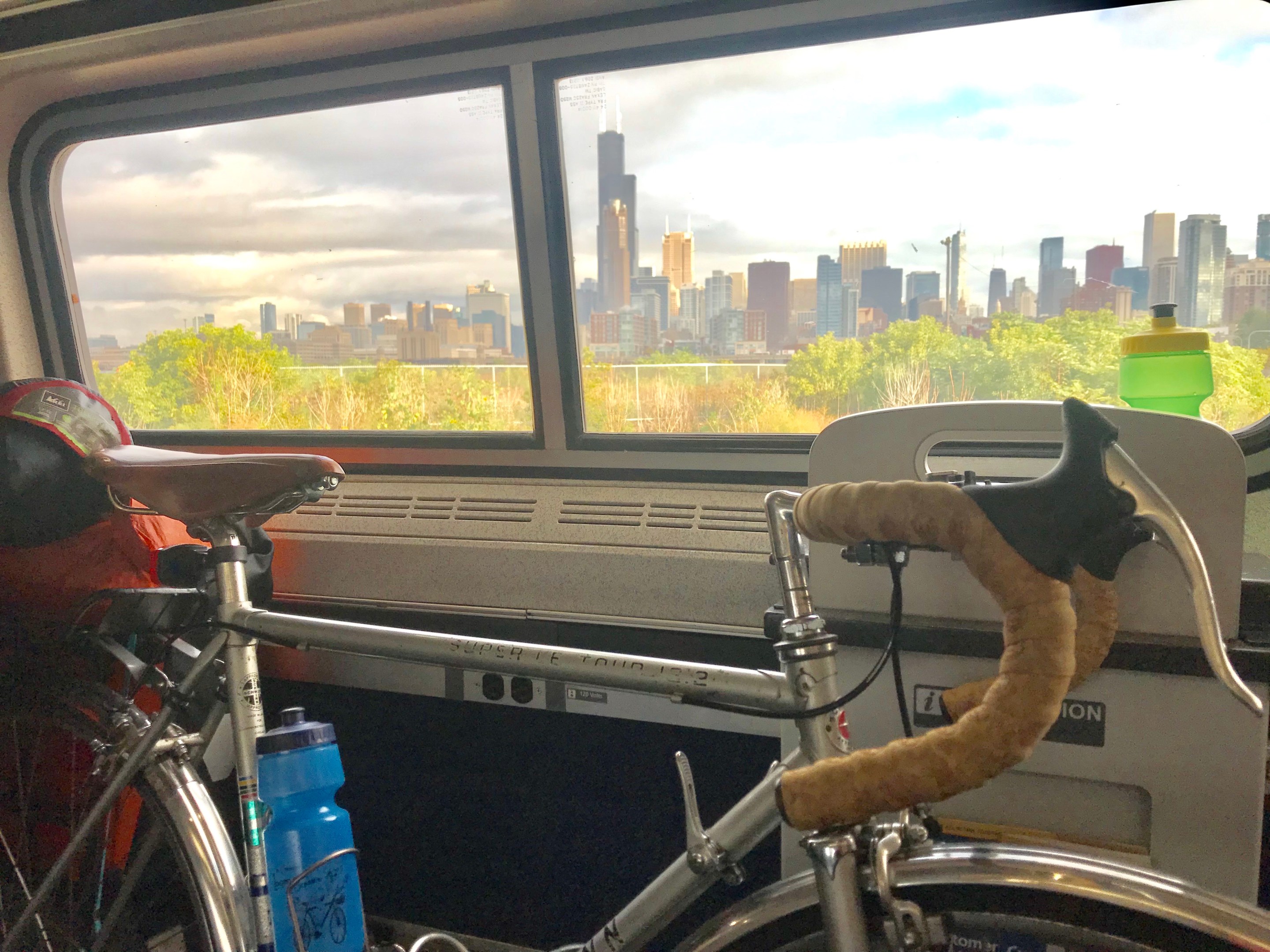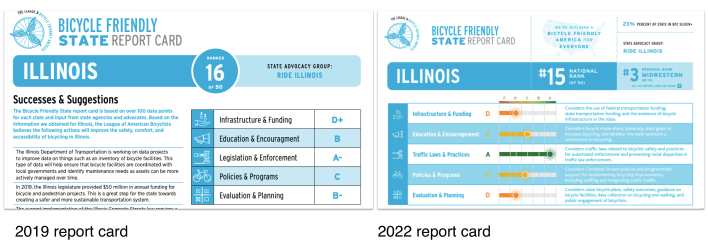Earlier this year, Streetsblog reported on the League of American Bicyclists’ Benchmarking Bike Networks report, which used Chicago as a case study for successful promotion of biking in urban areas. LAB recently released their report cards ranking bicycle friendliness at the state level. The reports rank states one to fifty and make recommendations on how state Departments of Transportation can improve safety, comfort and accessibility of biking.
Normally, LAB issues state report cards bi-annually but, due to the pandemic, the last report cards came out in 2019. This year, Illinois climbed one rung from 16 to 15 in the national rankings. Rankings are tabulated through a blend of federally-available data on ridership, fatalities, and spending on biking and walking per capita, and extensive surveys of state DOTs. Survey responses are graded in categories of funding and infrastructure, education and encouragement, traffic laws and practices, policies and programs, and evaluation and planning.
When I compared the 2022 to the 2019 report, I was surprised to see that despite a gain in national standing, the Prairie State’s grades on four out of the five survey-based metrics have actually fallen. Per-capita spending also fell, down to $3.03 from $3.73 the prior report. Did this increase in ranking, despite a decrease in scores, indicate worsening conditions for biking amongst the top states? Or at least a weakening of the policies, practices and funding that allow those conditions to thrive?
Ken McLeod, policy director at LAB, noted the complexities of grading based on survey data. McLeod said that the League did not receive a survey from the Illinois Department of Transportation this year resulting in a negative impact to the category grades. However, LAB uses backfilled data and averages to prevent scores from swinging wildly based on participation. Legislative wins — including the 2021 bill removing a 20 percent local cost match for bicycle accommodations on IDOT roads and $50 million in annual funding for walking and biking projects secured in 2019 — reported by advocacy group Ride Illinois didn’t show up in the survey-based funding score but are reflected in the report card’s narrative notes and helped boost Illinois’ standing.
Editor's note: An IDOT spokesperson stated the department submitted a 2022 survey to LAB. IDOT has aknoczwedged our request for a copy and we will update this story accordingly.
However, LAB grades on a curve and McLeod noted troubling nationwide trends in decreased safety and ridership over the last several years. The National Highway Traffic Safety Administration estimates that 9,560 people died in motor vehicle crashes in the first quarter of 2022—a 7 percent increase over the same period last year and the highest number of first-quarter fatalities in 20 years. In Chicago, 24 pedestrians and 8 bicyclists have been killed this year alone.
"The recent worrying trends have been making us think more about how we weigh outcomes and make sure our rankings and metrics result in better outcomes," McLeod said. "We see many states putting effort in but not seeing the outcomes we want to see: more people riding and being safer when they do."
McLeod noted that tracking actual infrastructure improvement would be a meaningful metric that could track and influence outcomes, making tangible impacts on bike safety and likely encouraging more people to ride. However, comparable state-level reporting on this metric is tricky as ownership of roadways varies from state to state. (What that means is that some states do more than others to provide bikeway infrastructure in municipalities while others rely on their municipalities to provide the bulk of bikeways.)
As for continuing to improve Illinois’ bike friendliness standings under the current system, LAB recommends updating the statewide bike plan adopted in 2014. McLeod points to Walk.Bike.Ohio and University of Minnesota’s research on bike facilities as exemplary research and planning initiatives.
The 2022 report card also recommends Illinois modernize its version of the "Manual on Uniform Traffic Control Devices" (MUTCD), the document which defines safety standards in road design and hasn’t been updated since 2009, to "reflect leading practices in bicycle facilities, intersection design, sidewalks, rumble strips, and other issues affecting bicycle and pedestrian safety."
These practices (and more) amount to a fundamental shift in thinking about roadway safety from controlling individual behavior to building safer transportation systems by design. The federal transportation department recommends a nationwide adoption of the Safe System approach used by countries that have surpassed the United States in bike friendliness.
“Traffic safety in the U.S. has been focused on the individual road users and their behaviors: are they wearing their seatbelt, are they intoxicated, are they speeding?” McLeod said. “The Safe System approach says people are going to have bad behaviors and they still shouldn’t die on our roadways. As planners, as engineers, as elected officials, it’s the responsibility of the system designers to make sure we are making it less likely people will die even when they make bad decisions, instead of getting people to not make bad decisions.”
Overall, the League’s 2022 report card for Illinois seems like a fair analysis of state-level efforts to promote bicycling: Better than most, but with plenty of room for improvement. But considering falling scores in all categories, perhaps the bigger picture is a need for rethinking road safety on a national scale.






